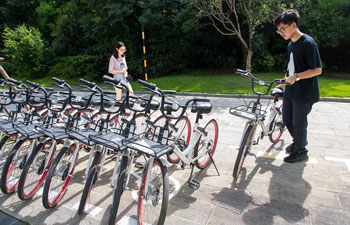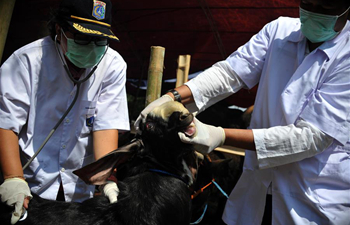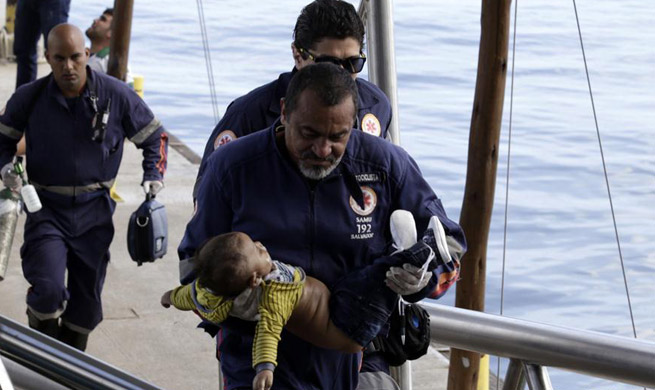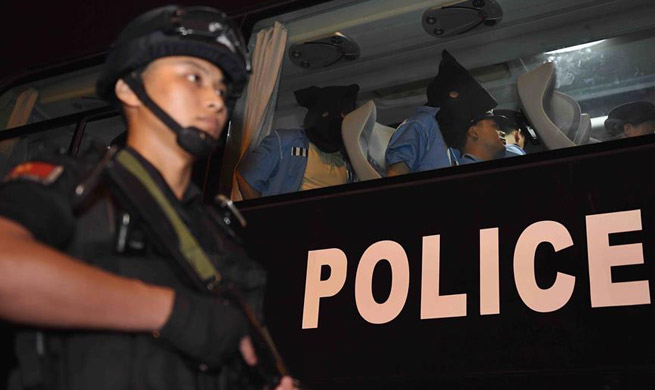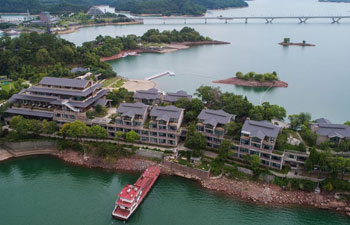LIVADIA, Greece, Aug. 25 (Xinhua) -- Lying at the foot of the mountain Elikon, Livadia, a small town in central Greece, located around 90 km northwest of Athens, has made around 400 refugees feel at home this year.
Syrian refugee Asad Bairam is one of the thousands of refugees who entered Greece hoping for a better life in northern Europe after fleeing conflict and poverty in the Middle East.
But, after the closure of the borders along the Western Balkan route in mid-February of 2016, they have been stranded in Greece living in camps in dire straits.
"For ten months, we felt like the walking dead. There was no education. No schools. There was no life... We suffered a lot in the camp," Asad said.
All that changed after moving into an apartment with his family at Livadia provided by UNHCR under the ambitious accommodation program ESTIA (Emergency Support to Integration and Accommodation) funded by the European Commission.
"We came here, and they welcomed us. I felt safe. Even though we have a different culture and language when you feel safe and you see a human being like you, barriers can be avoided," Asad said.
Making the refugees feel safe was a big challenge for locals, mayor of Livadia Yiota Poulou told Xinhua.
"We managed to accommodate the refugees in apartments across the city providing them human living conditions in a secure and peaceful environment," she said.
The 400 refugees who live in 70 apartments have found their smile again, the children go to school, the official noted.
After the success of the program in Livadia, which was the first small scale town after the capital Athens and big city port of Thessaloniki in northern Greece that participated in the program, ten more municipalities have followed.
Under the program ESTIA, a total of 30,000 places will be available in apartments and buildings by the end of 2017.
"There are around 18,000 places in apartments and buildings. We need to create with municipalities and some NGOs 12,000 more by the end of the year," Philippe Leclerc, UNHCR Representative in Greece told Xinhua during a recent interview.
Even though the living conditions have been improved drastically in the camps, Leclerc pointed out that the primary objective of the Greek government is to gradually close the camps on the mainland.
"We have seen some camps closing last year and this year in Macedonia, in northern Greece. We hope that more camps can close so that people can again live under normal conditions," he said.
For that to happen, more municipalities need to follow Livadia's example.
From their experience, Leclerc and Poulou agreed that there were many advantages for both the refugees and the local community.
"We have seen that asylum seekers feel more comfortable in their relationship with the local population of Greece and the municipalities gain a lot of expertise," Leclerc said.
"Through the program, the benefit for our society is that by the end of 2017 a total of 1.5 million euros (1.77 million U.S. dollars) is added in our budget reinforcing our local economy," Poulou added.
Despite the success, there were also many difficulties. Initially some locals expressed concern amounting to xenophobia.
"A network of solidarity developed that helped the local community to be prepared for the reception of the refugees," the mayor explained.
With a roof over their head, living next door to Greek neighbors and with cash assistance, the integration of the refugees in the local community would be the next big challenge. Many will remain in Greece and will not be relocated or resettled. ESTIA program must be supported, Poulou and Leclerc underlined.
"We need the European Commission to continue its funding, we need a commitment from the government to do and design an integration policy which is adapted to Greece of today," Leclerc said.
For the UNHCR Representative in Greece, it is essential that the asylum seekers get a tax number, a social security number, Greek language lessons, and not only subsidies by the European Commission, but also the government.
"(It is essential) to build as early as possible the capacity of the State, of the municipalities, the civil society which has shown its willingness to help despite the social and economic crisis that Greece is facing," Leclerc said.







